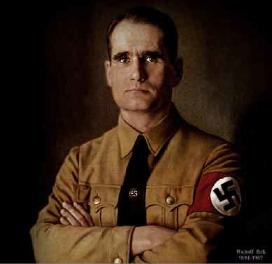Why Rudolf Hess Was Murdered
August 16, 2010
 by Alessandro de Felice
by Alessandro de Felice (edited and abridged from his website)
"I have come here, in Great Britain, to save humanity," he said. "I am Rudolf Hess."
Hess flew to Britain in a Messerschmitt-110 on May 10, 1941, intent on making contact with the Duke of Hamilton, who he believed would mediate a peace deal whereby Britain would join Nazi Germany in a war against the Soviet Union.
Despite official denials Hess flew to Britain with Hitler's full knowledge. There was a substantial peace party in Britain in 1941, which included most of the aristocracy, and the Royal Family. The King's brother, the Duke of Kent, was actively involved in Hess's peace mission; the fate of the real Deputy Fuhrer was inextricably linked with that of the Duke [of Kent] in 1942.
The terms of Hitler's peace proposal were discussed up and down England not only in well-informed political circles but in pubs, bomb shelters and Pall Mall clubs. It was too elaborate a secret to be kept.
Cabinet members presumably told their friends in Parliament and the MP's told their club colleagues and the news percolated down.
Hitler's peace offer was so generous it jeopardized the banker's plans for World War Two.
Hitler offered total cessation of the war in the West. Germany would evacuate all of France except Alsace and Lorraine, which would remain German. It would evacuate Holland and Belgium, retaining Luxembourg. It would evacuate Norway and Denmark.
In short, Hitler offered to withdraw from Western Europe, except for the two French provinces and Luxembourg [Luxembourg was never a French province, but an independent state of ethnically German origin], in return for which Great Britain would agree to assume an attitude of benevolent neutrality towards Germany as it unfolded its plans in Eastern Europe. In addition, the Führer was ready to withdraw from Yugoslavia and Greece.
German troops would be evacuated from the Mediterranean generally and Hitler would use his good offices to arrange a settlement of the Mediterranean conflict between Britain and Italy. No belligerent or neutral country would be entitled to demand reparations from any other country, he specified.
Hess carried also proposals for sparing the European Jews, simply advising the British Government about the old Polish idea of relocating them to Madagascar.
So, if Hess ' proposals had been accepted in May 1941, there would never have been a Shoah.
It was a hopeless mission based on a fundamental misunderstanding of the British establishment. The plan was to entrap Germany in a two-front war and destroy it. Britain and the USSR were in cahoots. Hitler's proposals were too generous. Hess had to be imprisoned and possibly murdered or he would spoil the plot.
SPANDAU PRISONER NOT HESS
There is substantial evidence that the prisoner who died in Spandau prison was not the real Rudolf Hess.
Alan Dulles, who became the head of the CIA, was of the opinion that the man who was condemned to life imprisonment at Nuremberg, was not the real Rudolf Hess - as was President Roosevelt himself.
And in the 1970s, a British surgeon and ballistics expert, Dr. Hugh Thomas, actually had chance to physically examine the old man in Spandau. He knew that the real Hess had been wounded by a bullet in the First World War; so he looked on the old man's body for signs of the wound but couldn't find it.
Now we're not talking about someone who simply cast an eye over the man without knowing what he was looking for. Dr. Hugh Thomas is a surgeon and a ballistics expert who has been used in trials such as Bloody Sunday, so he really knows what he's talking about. Also, there are circumstantial things, if you like.
The man at Nuremberg refused to see his family and in fact he also refused to see anyone other than his lawyer for over twenty years - which is astonishing considering that he'd been locked up, and you would think he would want to see them.
Also, at Nuremberg the man had convenient amnesia. He behaved very oddly; he failed to recognize people that had worked closely with the real Hess. And at times he also failed to recognize colleagues in the Nazi hierarchy.
Hermann Goring, a co-defendant at the trial, was quite amused when someone was talking to him about Hess. This isn't an exact quote, but Goring said: "Hess? Which Hess? The Hess you have here? Our Hess? Your Hess?"
---
Related- "Did Hitler Betray Rudolf Hess and Germany?"







NJ said (August 19, 2010):
I will go out on a limb here with some future forecasting. I have the feeling, given a little more passage of time and a more general acceptance of uncovered history, that Rudolf Hess will be seen as one of the great heros of WWII and Hitler himself will not be seen in quite the negative light that he has been for three quarters of a century.
But then that's an uphill journey since the Jews have a long-standing investment in the bad image of Hitler, and would fight an objective reanalyses of Hitler's reputation every step of the way.
But Henry, we are not talking here about Vlad The Impaler.